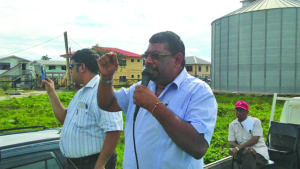
Several sections of the commercial zone in Berbice, Region Six (East Berbice-Corentyne) on Wednesday close their businesses as the Private Sector joined sugar workers from the Skeldon Estate and others in a rally against Government’s decision to privatise that estate.
As sugar workers continue to voice concerns over Government’s announcement that the Skeldon Sugar Factory will be sold, hundreds of them and officials of the Guyana Agricultural and General Workers Union (GAWU) and the National Association of Agricultural, Commercial and Industrial Employees (NAACIE) were joined by the municipality, taxi drivers, market vendors, the Chamber of Commerce and other members of the Private Sector in a march through the town of Corriverton.
Region Six Chairman David Armogan, speaking at a rally following the march, said that Guyana’s economy was likely to collapse if more sugar estates were closed. Armogan said the Government has been “fooling” citizens by saying that it was not economically feasible to keep the Guyana Sugar Corporation (GuySuCo) going.

“They are saying that every year they have to plug about G$9 billion into GuySuCo to keep it afloat. If you look at G$9 billion it is just about 1.5 per cent of our GDP [Gross Domestic Product] and just about 3.6 per cent of our National Budget. Is that too much to keep 60,000 people going? The answer is no,” Armogan said.
He argued that Government could continue in the short term to plug G$9 billion into the industry considering that it was a very small percentage of the national budget. He further noted that most of that money would return to Government, but more than that it would keep the economy spinning.
The Private Sector Commission (PSC) and its affiliates; the Georgetown Chamber of Commerce and Industry (GCCI); the Guyana Manufacturing and Services Association (GMSA); the Upper Corentyne Chamber of Commerce and Industry; the Linden Chamber of Industry, Commerce and Development; the Region Three Chamber of Commerce and Industry; the Central Corentyne Chamber of Commerce and the Berbice Chamber of Commerce and Development Association have all called on Government to rethink its plan to close and privatise estates in Berbice.
The Government has expressed its intention to downscale the sugar industry and to commence with the closure of estates, but Armogan said the consequences would be dire.
“When you shut down the sugar industry and when you sell out the sugar industry, not only will the workers who work in the industry suffer but also all others who operate within the environment of the sugar industry will also suffer. The shopkeepers will have to close their doors, because people don’t have money to buy, which means that they will send home their workers and that means that more people will become unemployed. The taxi drivers will come off the road because people are not travelling,” the Regional Chairman said.
Unemployment
GAWU is contending that any selling of the factory would eventually put the workers out of employment since investors were not interested in the estate but in the cogeneration plant, which can be operated at a cheaper cost with the use of other materials than that was left of the cane stalk when the juice was extracted.
According to the Union, work at the sugar estate is the main avenue of employment, as has been the case for generations in that populous rural community. The closure will leave a vacuum that will not only gravely impact workers but also force businesses and service providers to curtail or end operations, thus making the bad situation even worse.
Addressing the rally, parliamentarian Dr Vishwa Mahadeo said the Government planned to close several estates and sell one when in its campaign leading up to the May 2015 General Election, it promised to give sugar workers better wages. Instead for the past two years, workers have not received their Annual Production Incentive (API) and now it is getting even worse.
“They want to take away your jobs; the sad thing is that they did it without consulting you,” Mahadeo highlighted.
However, GAWU General Secretary Seepaul Narine said he was of the belief that there were consultations before the decision to close and privatise sugar estates. He said Prime Minister Moses Nagamootoo and Vice President Khemraj Ramjattan most likely consulted with President David Granger since they were both from Berbice. The President and Government are holding out that there was some level of consultation before decisions were made.
The workers who attended the rally shouted ‘No’ when asked whether they were consulted on future plans for the industry.
Narine said Government has said that GuySuCo is in debt to the tune of G$80 billion, but in reality, it is only G$17 billion. He noted that that was so since Government took care of a G$30 billion debt on a loan it had taken to upgrade the factory and there was the pension liability. This G$30 billion debt, he explained, is superficial since all of GuySuCo’s workers would not become pensioners tomorrow and they would not all live to become 101 years old. He noted that for a company of its size a G$17 billion debt was not unusual, since the company was not bankrupt.
NAACIE’s General Secretary Dowchand Nagasar said he had first-hand experience of what could happen when an estate closed. He said the community of Wales has become a ghost town and when the announcement was made of the closure, parts started disappearing from the factory. He added that only a few acres of rice the Agriculture Ministry has planted at Wales and much of it has been destroyed by birds. (Andrew Carmichael)



